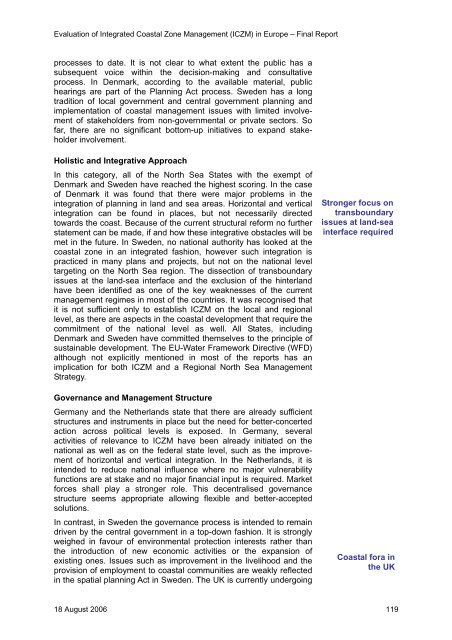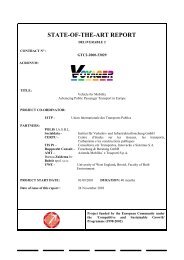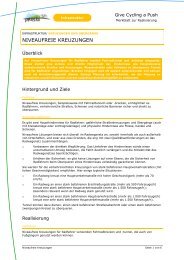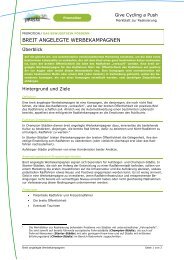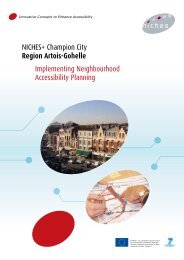Evaluation of Integrated Coastal Zone Management (ICZM) in ...
Evaluation of Integrated Coastal Zone Management (ICZM) in ...
Evaluation of Integrated Coastal Zone Management (ICZM) in ...
You also want an ePaper? Increase the reach of your titles
YUMPU automatically turns print PDFs into web optimized ePapers that Google loves.
<strong>Evaluation</strong> <strong>of</strong> <strong>Integrated</strong> <strong>Coastal</strong> <strong>Zone</strong> <strong>Management</strong> (<strong>ICZM</strong>) <strong>in</strong> Europe – F<strong>in</strong>al Report<br />
processes to date. It is not clear to what extent the public has a<br />
subsequent voice with<strong>in</strong> the decision-mak<strong>in</strong>g and consultative<br />
process. In Denmark, accord<strong>in</strong>g to the available material, public<br />
hear<strong>in</strong>gs are part <strong>of</strong> the Plann<strong>in</strong>g Act process. Sweden has a long<br />
tradition <strong>of</strong> local government and central government plann<strong>in</strong>g and<br />
implementation <strong>of</strong> coastal management issues with limited <strong>in</strong>volvement<br />
<strong>of</strong> stakeholders from non-governmental or private sectors. So<br />
far, there are no significant bottom-up <strong>in</strong>itiatives to expand stakeholder<br />
<strong>in</strong>volvement.<br />
Holistic and Integrative Approach<br />
In this category, all <strong>of</strong> the North Sea States with the exempt <strong>of</strong><br />
Denmark and Sweden have reached the highest scor<strong>in</strong>g. In the case<br />
<strong>of</strong> Denmark it was found that there were major problems <strong>in</strong> the<br />
<strong>in</strong>tegration <strong>of</strong> plann<strong>in</strong>g <strong>in</strong> land and sea areas. Horizontal and vertical<br />
<strong>in</strong>tegration can be found <strong>in</strong> places, but not necessarily directed<br />
towards the coast. Because <strong>of</strong> the current structural reform no further<br />
statement can be made, if and how these <strong>in</strong>tegrative obstacles will be<br />
met <strong>in</strong> the future. In Sweden, no national authority has looked at the<br />
coastal zone <strong>in</strong> an <strong>in</strong>tegrated fashion, however such <strong>in</strong>tegration is<br />
practiced <strong>in</strong> many plans and projects, but not on the national level<br />
target<strong>in</strong>g on the North Sea region. The dissection <strong>of</strong> transboundary<br />
issues at the land-sea <strong>in</strong>terface and the exclusion <strong>of</strong> the h<strong>in</strong>terland<br />
have been identified as one <strong>of</strong> the key weaknesses <strong>of</strong> the current<br />
management regimes <strong>in</strong> most <strong>of</strong> the countries. It was recognised that<br />
it is not sufficient only to establish <strong>ICZM</strong> on the local and regional<br />
level, as there are aspects <strong>in</strong> the coastal development that require the<br />
commitment <strong>of</strong> the national level as well. All States, <strong>in</strong>clud<strong>in</strong>g<br />
Denmark and Sweden have committed themselves to the pr<strong>in</strong>ciple <strong>of</strong><br />
susta<strong>in</strong>able development. The EU-Water Framework Directive (WFD)<br />
although not explicitly mentioned <strong>in</strong> most <strong>of</strong> the reports has an<br />
implication for both <strong>ICZM</strong> and a Regional North Sea <strong>Management</strong><br />
Strategy.<br />
Governance and <strong>Management</strong> Structure<br />
Germany and the Netherlands state that there are already sufficient<br />
structures and <strong>in</strong>struments <strong>in</strong> place but the need for better-concerted<br />
action across political levels is exposed. In Germany, several<br />
activities <strong>of</strong> relevance to <strong>ICZM</strong> have been already <strong>in</strong>itiated on the<br />
national as well as on the federal state level, such as the improvement<br />
<strong>of</strong> horizontal and vertical <strong>in</strong>tegration. In the Netherlands, it is<br />
<strong>in</strong>tended to reduce national <strong>in</strong>fluence where no major vulnerability<br />
functions are at stake and no major f<strong>in</strong>ancial <strong>in</strong>put is required. Market<br />
forces shall play a stronger role. This decentralised governance<br />
structure seems appropriate allow<strong>in</strong>g flexible and better-accepted<br />
solutions.<br />
In contrast, <strong>in</strong> Sweden the governance process is <strong>in</strong>tended to rema<strong>in</strong><br />
driven by the central government <strong>in</strong> a top-down fashion. It is strongly<br />
weighed <strong>in</strong> favour <strong>of</strong> environmental protection <strong>in</strong>terests rather than<br />
the <strong>in</strong>troduction <strong>of</strong> new economic activities or the expansion <strong>of</strong><br />
exist<strong>in</strong>g ones. Issues such as improvement <strong>in</strong> the livelihood and the<br />
provision <strong>of</strong> employment to coastal communities are weakly reflected<br />
<strong>in</strong> the spatial plann<strong>in</strong>g Act <strong>in</strong> Sweden. The UK is currently undergo<strong>in</strong>g<br />
Stronger focus on<br />
transboundary<br />
issues at land-sea<br />
<strong>in</strong>terface required<br />
<strong>Coastal</strong> fora <strong>in</strong><br />
the UK<br />
18 August 2006 119


